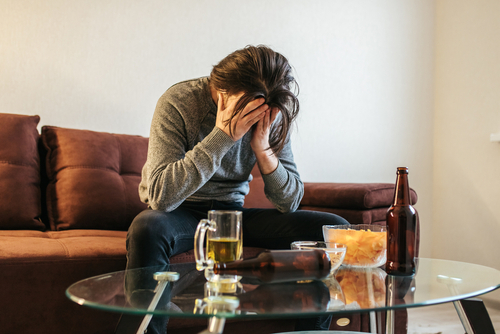When it comes to abstaining from an addictive substance, some people believe in tapering off slowly, while others believe in stopping consumption immediately. If you or a loved one engages in alcohol abuse, you may wonder, “what are the dangers of quitting alcohol cold turkey?”
In this article, we will cover the stages of alcohol withdrawal symptoms, the dangers of quitting alcohol cold turkey, the benefits of using a treatment center when quitting drinking, and addiction treatment plans.
Alcohol Addiction by the Numbers
When it comes to substance use disorders, the specific substance that more people become addicted to than any other is alcohol. Fourteen million adults in the U.S. struggle with alcohol addiction, with over 400,000 young people ages 12-17 also dealing with this illness. Only 6-7% of those who have an addiction to alcohol each year actually seek treatment for it.
Those who find themselves unable to stop their compulsive drinking often reach a point where they want to commit to becoming sober. Part of what makes it difficult for them is not knowing if they should quit drinking cold turkey, which means stopping all alcohol consumption at once. Many people aren’t certain what withdrawal will feel like and if it can be done solo.
Despite how many people addicted to alcohol believe it to be a mood elevator, it is actually a depressant. It slows down a person’s brain function and alters the way nerves send messages in their body. The body becomes acclimated to operating this way, which makes the sudden loss of alcohol it has depended on result in withdrawal symptoms. This means it can be dangerous to quit alcohol cold turkey, particularly when done without professional, round-the-clock medical care. Having that kind of care dramatically reduces the risks involved.

The Stages of Withdrawal From Alcohol Abuse
When a person quits drinking cold turkey, they typically experience acute withdrawal symptoms first. These symptoms include many physical maladies, beginning as early as a few hours after a person’s last drink. Symptoms can include:
- Headaches
- Body aches
- Increased heart rate
- Nausea and vomiting
- Diarrhea
- Loss of appetite
- Shakiness
- Sweating
- Insomnia
- Restlessness
For some, symptoms such as hallucinations and seizures may occur, typically 12-48 hours after their last drink.
After initial detoxification and any resulting symptoms it causes, some people experience Post-Acute Withdrawal Syndrome, or PAWS for short. While the effects of PAWS can include some physical ailments, they present more in the form of emotional and psychological difficulties. Symptoms of PAWS can include the following:
- Difficulty sleeping
- Anxiety
- Depression
- Mood swings
- Trouble focusing and thinking clearly
- Decreased appetite
- Problems dealing with stressful feelings
Approximately 5% of people going through alcohol withdrawal develop delirium tremens, often referred to as the “DTs.” Delirium tremens usually develop somewhere 48-72 hours after a person has their last alcoholic drink. DT symptoms include a racing heart, fever, heavy sweating, and mental confusion. A person suffering from delirium tremens often needs hospitalization, partly because of the risk of this condition becoming deadly.
Timeline of Alcohol Withdrawal
Alcohol withdrawal syndrome varies in onset time among individuals, but it usually begins within 6 to 24 hours after the last consumption of alcohol and can persist for several days. The withdrawal process can be categorized into different stages with distinct symptoms.
- Stage 1: The first stage, which occurs between 6-12 hours after the last drink, is characterized by relatively mild symptoms such as insomnia, mild anxiety, tremors, stomachache, headache, excessive sweating, heart palpitations, and loss of appetite.
- Stage 2: During the second stage, which occurs between 12-24 hours, some individuals may experience hallucinations. These can be visual, auditory, or tactile in nature and can be distressing for the person experiencing them.
- Stage 3: The third stage, which occurs between 24-48 hours, is the most critical stage, with an increased risk of seizures. Medical attention should be sought immediately if seizures occur, as they can be life-threatening.
- Stage 4: In the fourth and final stage, which occurs between 48-72 hours, the risk of developing alcohol withdrawal delirium (or DTs) is at its highest. Symptoms during this stage include psychomotor agitation, hallucinations, disorientation, rapid heart rate, high blood pressure, fever, and sweating. It is essential to seek medical attention immediately if these symptoms are present.

The Dangers of Quitting Alcohol Cold Turkey
Quitting alcohol cold turkey can be dangerous for individuals consuming large amounts of alcohol regularly. This is because the body becomes dependent on alcohol, and when it is suddenly stopped, it can result in severe withdrawal symptoms.
It is essential to note that quitting alcohol cold turkey should only be attempted under the supervision of a healthcare professional. Medical detoxification programs can help individuals manage withdrawal symptoms safely and effectively while reducing the risks associated with sudden alcohol cessation. Healthcare professionals can also monitor the individual’s vital signs and provide medications to alleviate symptoms.
Medical Supervision When Quitting Drinking Offers Many Benefits
The answer to the question of if it is dangerous to quit alcohol cold turkey is that it can be, particularly if someone does it alone. The many side effects that often occur during acute withdrawal from alcohol and post-acute withdrawal syndrome make it potentially dangerous for someone to attempt quitting drinking without professional help.
Withdrawal from alcohol in a clinical setting offers the safest way for someone ready to leave their addiction behind. Detoxification and other residential treatment programs provide trained professionals who can identify withdrawal symptoms and offer assistance in combatting them.
The initial acute withdrawal symptoms can often be eased via medication-assisted treatment administered by a medical professional. Longer-term PAWS symptoms can be managed in residential and sober living house environments.
Addiction Treatment Addresses Mental Health Issues and More
In addition to helping to deal with withdrawal symptoms, professional treatment programs often offer assistance with co-occurring mental illnesses. Co-occurring diagnoses, also known as dual diagnosis, involve having one or more mental health conditions in addition to a substance use disorder.
About half of all people with an addiction to drugs or alcohol also have at least one mental health problem. Having this diagnosed and a treatment plan formulated for managing it can make a world of difference for many who otherwise might not get help for their mental health. Because addiction can aggravate mental health symptoms and a mental illness can increase a person’s urge to use drugs or alcohol, this makes addressing both conditions simultaneously effective and vital.
Many treatment programs address the nutritional needs of their clients. Residential programs may offer medical assessments to help people understand how to eat a healthier diet. Sober living houses often offer nutritional counseling and the opportunity to shop for and prepare food with a person’s peers within the home.

Alcohol Addiction Treatment in California
If you or a loved one want to start living a sober life but are worried about withdrawal symptoms, Riviera Recovery can help you. We offer sober living housing in Southern California to young adults who want to learn how to manage their sobriety and prepare for living their new lives. Our houses are gender-specific and pet-friendly. We offer partnership programs for several kinds of therapy, holistic treatment, and experiential activities.
Alcohol use disorder is a complex and challenging disorder to treat on your own. If you are ready to leave your alcohol addiction behind, contact us now to find out how we can help you take control of your life.


